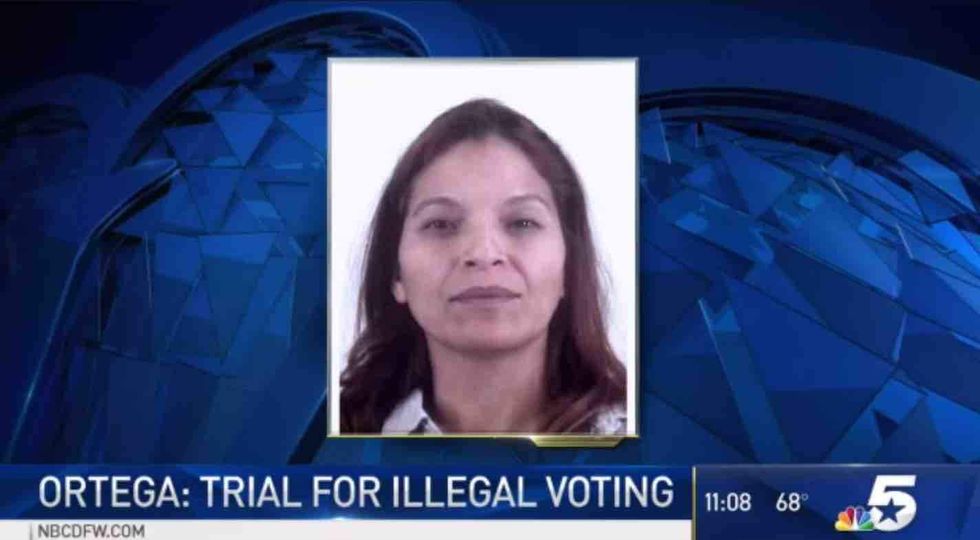
Rosa Maria Ortega (Image source: KXAS-TV)

A Texas woman was sentenced Thursday to eight years in prison and slapped with thousands of dollars in fines for committing voter fraud.
Rosa Maria Ortega of Grand Prairie, Texas, is a Mexican citizen, but a legal U.S. resident, KDFW-TV reported. She is not a U.S. citizen, thus making her ineligible to vote. Ortega, now 37, came to the U.S. with her mother when she was a child, according to KXAS-TV.
Ortega was arrested and indicted on two counts of illegal voting in 2015 after police discovered she had applied for voter registration in Dallas County, Texas, and that she had falsely indicated on the application form she was a U.S. citizen. This, after a statement from Texas Attorney General Ken Paxton said Ortega applied for voter registration in nearby Tarrant County five months earlier, but was rejected because she marked that she was not a U.S. citizen, but a U.S. legal resident.
Ortega's lawyer argued during her trial, however, that Ortega did not understand the difference between a "resident" and "citizen."
KXAS-TV reported that Ortega never voted in Tarrant County. But according to Toni Pippins-Poole, Dallas County elections administrator, Ortega illegally voted at least five times in Dallas County. The most recent violation was during the Republican primary in May 2014, Pippins-Poole told KXAS-TV. The Fort Worth Star Telegram reported Ortega also voted in the 2012 general election.
Each one of Ortega's two charges carried the potential sentence of up to 20 years in prison. While Ortega got one-fifth of the possible prison sentence for both charges, the Dallas Morning News reported she was als0 fined $5,000 for each count.
“This case shows how serious Texas is about keeping its elections secure, and the outcome sends a message that violators of the state’s election law will be prosecuted to the fullest," Texas Attorney General Ken Paxton said, according to multiple outlets.
Ortega's sentence came as President Donald Trump and his administration have vowed to crack down on voter fraud. But exactly how the president plans to do that remains to be seen, given the fact the 50 individual states oversee all national and state elections.
According to Ballotpedia, nine states — New Hampshire, Virginia, Georgia, Mississippi, Tennessee, Wisconsin, Kansas, Indiana and Ohio — have enacted "strict photo ID" voter laws. Three more states — Texas, Arizona and Ohio — have "strict non-photo ID" voter laws. Nineteen states have what Ballotpedia described as "non-strict photo ID" or "non-strict non-photo ID" voter laws. The remaining 19 states have no voter ID requirements.
Ballotpedia based its "strict" and "non-strict" characterizations on standards applied by the National Council of State Legislatures.
"Under strict requirements, a voter who does not possess the required form of identification may be required to cast a provisional ballot," Ballotpedia explained. "Under non-strict requirements, a voter who does not have the necessary identification may still vote without casting a provisional ballot."
The president was criticized recently for claiming that "millions" of people voted illegally in the 2016 presidential election, without providing a shred of evidence to support his claim. Nevertheless, Trump called for a "major investigation" into the issue of voter fraud. Trump told Fox News host Bill O'Reilly during an interview airing Sunday that he would put Vice President Mike Pence in charge of leading that effort.
"I'm going to set up a commission to be headed by Vice President Pence and we're going to look at it very, very carefully," Trump said, Reuters reported.